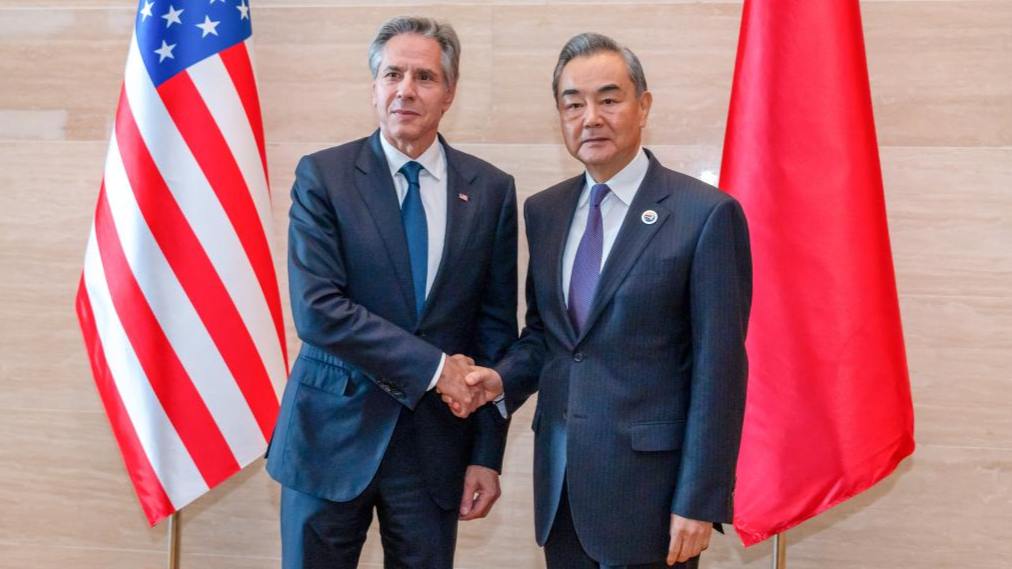FM says bilateral relationship is at critical juncture, needs to be stabilized

Amid accumulating risks and challenges in relations between China and the United States, Beijing has again urged Washington to return to a rational and pragmatic policy toward China and to properly manage their differences, in order to promote a stable, healthy and sustainable bilateral relationship.
During a meeting in Laos on Saturday with US Secretary of State Antony Blinken, Foreign Minister Wang Yi warned that the bilateral relationship is at a critical juncture and needs to be stabilized, requiring managing risks, properly handling differences, eliminating disturbances and promoting cooperation.
READ MORE: China, US agree to maintain communication at all levels
Wang, who is also a member of the Political Bureau of the Communist Party of China Central Committee, also reiterated China's position on the Taiwan question, which is at the very center of China's core interests. Beijing has said on many occasions that the Taiwan question is the first red line that must not be crossed in China-US relations.
Wang emphasized that "Taiwan independence" is incompatible with peace across the Taiwan Strait. "We will counter every provocation by the 'Taiwan independence' forces, keep narrowing the space for 'Taiwan independence', and work toward the goal of a complete national reunification," he said.
The meeting took place at the request of the US side on the sidelines of a series of meetings of the foreign ministers of Southeast and East Asian countries in Vientiane, the capital of Laos.
It also came as China-US relations continue to be mired in a situation in which the US does not refrain from moving to contain and suppress China, although the diplomatic, financial, law enforcement and climate teams of the two sides, as well as the two militaries, have maintained communication in the past three months.
Blinken's stop in Laos was part of his visit to multiple Asian nations, including Vietnam, the Philippines, Singapore and Mongolia.
In June, the US State Department approved arms sales to Taiwan, including drones and missiles, for an estimated $360 million, a move that Beijing criticized, saying that Washington was sending a serious, erroneous signal to separatist forces seeking "Taiwan independence".
Furthermore, on July 12, US President Joe Biden signed into law the so-called Promoting a Resolution to the Tibet-China Dispute Act, which China considers to be another manifestation of the US practicing hegemonism, manipulating the rhetoric of democracy and freedom, and interfering in China's internal affairs.
During a news conference at the G20 Finance Ministers and Central Bank Governors Meeting held in Brazil on Thursday, US Treasury Secretary Janet Yellen said she would press China to address the country's macroeconomic model that has led to what she called "overcapacity".
Beijing criticized Yellen for engaging in a political show to shift the blame for the US' domestic problems to China, saying that the real purpose behind the US' hyping of China's so-called new energy "overcapacity "is to contain China's advantage in the new energy industry.
Wang told Blinken that China's policy toward the US has always been consistent and follows the principles of mutual respect, peaceful coexistence and win-win cooperation.
He criticized Washington for adhering to the wrong perception of China, and said China is not the US and does not want to be. He also said that China does not seek hegemony or power politics and, as a major country, has the best record on peace and security.
During the meeting, Wang also urged the US not to stir up trouble and undermine maritime stability regarding China's Ren'ai Reef in the South China Sea.
He said that China has reached a temporary arrangement with the Philippines to manage the situation, and the Philippines should honor its commitments to refraining from sending construction materials to its illegally grounded vessel at China's Ren'ai Reef.
Both sides also exchanged views on the Ukraine crisis, the situation in Gaza, and the Korean Peninsula, among other matters.
On the Ukraine crisis, Wang said that China's position is fair and transparent, and it will continue to promote peace talks. He urged the US to stop abusing unilateral sanctions and long-arm jurisdiction.
ALSO READ: Exchanges to help bolster China-US ties
China rejects false accusations and will not succumb to pressure or blackmail, and it will take resolute measures to protect its major interests and legitimate rights, Wang said.
Blinken said Washington is committed to stabilizing US-China relations and adheres to the one-China policy.
The US looks forward to maintaining regular communication with China for cooperation on anti-drug efforts and artificial intelligence and in other fields, he said, adding that the US is willing to manage differences with China to avoid misunderstandings and miscalculations.
Both sides agreed to maintain communication at all levels and further implement the important consensus reached at the San Francisco meeting in November between the two heads of state.


